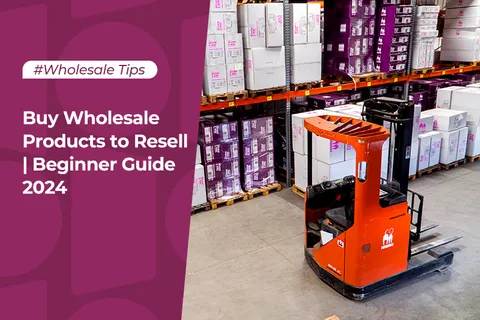Buy Wholesale Products to Resell | Beginner Guide 2024

Table of Contents
Starting a reselling business by purchasing wholesale products can be a lucrative venture for entrepreneurs looking to enter the e-commerce realm. Whether you're an aspiring entrepreneur or an established retailer seeking to diversify your offerings, buying wholesale products to resell can provide a sustainable revenue stream. This beginner guide will walk you through the essential steps to kickstart your wholesale reselling journey.
Introduction to Buying Wholesale Products to Resell
Buying wholesale products to resell can be a lucrative venture for entrepreneurs looking to start or expand their businesses. Wholesale purchasing involves buying goods in bulk directly from manufacturers or distributors at discounted prices, to resell them at a profit. This model allows resellers to benefit from economies of scale and competitive pricing, ultimately maximizing their profit margins.

Wholesale Business Models You Need to Know
Dropshipping
Dropshipping is a wholesale business model where the retailer (dropshipper) does not keep products in stock but instead transfers customer orders and shipment details to a third-party supplier or manufacturer (dropship supplier), who then fulfills the order and ships it directly to the customer. In this model, the retailer acts as a middleman, marketing, and selling products without the need for inventory management, warehousing, or order fulfillment. Dropshipping offers several advantages, including low startup costs, minimal risk, and flexibility in product selection.
However, dropshippers may face challenges such as lower profit margins, reliance on dropship suppliers for product quality and fulfillment, and potential issues with shipping times and customer service. Successful dropshipping businesses focus on niche markets, optimize marketing strategies, and establish strong relationships with reliable dropship suppliers to ensure customer satisfaction and profitability.
Wholesale Warehousing
Wholesale warehousing refers to the practice of storing goods in bulk quantities within dedicated warehouse facilities, typically operated by wholesalers. In this arrangement, wholesalers purchase products in large quantities directly from manufacturers or distributors at discounted prices and store them in warehouses before distributing them to retailers, e-commerce businesses, or other customers.
Wholesale warehousing plays a crucial role in the supply chain by providing a centralized location for inventory storage, facilitating efficient order fulfillment, and enabling economies of scale through bulk purchasing. These warehouses are equipped with advanced inventory management systems, storage solutions, and logistics infrastructure to ensure the timely and organized handling of goods. By leveraging wholesale warehousing services, businesses can streamline their distribution operations, reduce costs, and improve overall efficiency in managing inventory and fulfilling customer orders.

Step-by-step Guidelines
Step1: Researching Products to Resell
When researching products to resell, one effective strategy is to focus on bulk ordering. Bulk ordering allows resellers to purchase products in large quantities, often at discounted prices, which can increase profit margins. By identifying suppliers or manufacturers who offer bulk order options, resellers can negotiate better deals and secure a steady supply of inventory. Additionally, bulk ordering enables resellers to meet the demands of their customers more efficiently, as they can fulfill orders promptly without worrying about stock shortages.
Moreover, resellers should conduct thorough market research to identify products with high demand and profit potential before committing to bulk orders. This ensures that their investment yields maximum returns and minimizes the risk of inventory sitting unsold. Overall, incorporating bulk ordering into the product sourcing strategy can be a lucrative approach for resellers looking to optimize their operations and profitability.
Step2: Finding Reliable Wholesale Suppliers
Finding reliable wholesale suppliers is crucial for resellers looking to buy wholesale products. One popular platform for sourcing wholesale goods is Chovm. To ensure reliability, resellers should start by thoroughly researching potential suppliers on Chovm. This involves reading reviews, checking ratings, and assessing the supplier's track record. For example, they can look for suppliers with a high number of positive reviews and a proven history of delivering quality products on time.
Additionally, resellers should communicate directly with suppliers to discuss their specific needs and requirements. This allows them to gauge the supplier's responsiveness and professionalism. Furthermore, requesting samples before making bulk purchases is a smart way to verify the quality of the products and the reliability of the supplier. By taking these steps, resellers can mitigate the risk of dealing with unreliable suppliers and establish long-term partnerships with trustworthy wholesalers on platforms like Chovm.
Step3: Negotiating with Suppliers
Negotiating with suppliers is a crucial skill for resellers looking to buy wholesale products, especially when dealing with bulk items intended for resale. One effective strategy is to leverage the potential for large-volume purchases to negotiate better prices or additional perks such as discounted shipping or extended payment terms. For example, resellers can express their intent to make repeat orders or commit to purchasing a significant quantity over time, which can incentivize suppliers to offer more favorable terms.
Additionally, demonstrating a strong understanding of market trends and demand can strengthen negotiating positions. Resellers can highlight their market research findings to justify their desired price points or request customization options to differentiate their offerings. Moreover, building a mutually beneficial relationship with the supplier based on trust and reliability can open the door to more flexible negotiation opportunities in the future. By effectively negotiating with suppliers, resellers can secure competitive prices and terms, ultimately maximizing their profit margins when reselling bulk items.
Step4: Setting Up Your Reselling Business
Setting up a reselling business revolves around strategic sourcing of wholesale products, particularly bulk items intended for resale. The first step is to conduct thorough market research to identify high-demand products with profit potential. Once identified, resellers can then explore sourcing options, focusing on suppliers offering bulk order capabilities. Platforms like Chovm or wholesale trade shows can be valuable resources for finding reliable suppliers. Negotiating favorable terms, such as discounted prices or flexible payment arrangements, is crucial when buying wholesale products in bulk.
Besides, establishing efficient inventory management systems to track stock levels and sales performance is essential for optimizing operations. Building a strong online presence through e-commerce platforms or social media channels can help attract customers and drive sales. Providing excellent customer service and maintaining a positive reputation is also vital for long-term success. By effectively leveraging bulk orders and strategic sourcing strategies, resellers can establish a profitable business model in the competitive reselling market.
Step5: Marketing Your Products
Marketing your products effectively is crucial for reaching your target audience and driving sales. Two powerful avenues for promoting your products are through online platforms and social media marketing.
Online Platforms
Utilizing online platforms such as e-commerce websites, marketplaces, and online forums can significantly expand your product's visibility. Platforms like Amazon, eBay, Etsy, or Shopify offer opportunities for resellers to list their products and reach a wide audience. Optimizing product listings with high-quality images, detailed descriptions, and relevant keywords is essential for attracting potential buyers. Additionally, leveraging features like sponsored listings or advertising can boost visibility and drive traffic to your products. Furthermore, participating in online communities or forums related to your niche can help establish credibility and generate interest in your products.
Social Media Marketing
Social media platforms like Facebook, Instagram, Twitter, and Pinterest offer powerful marketing tools for promoting your products. Creating engaging content that showcases your products in action, such as photos, videos, or tutorials, can captivate your audience and drive engagement. Utilizing hashtags and geotags can increase discoverability and attract users interested in your niche. Collaborating with influencers or brand ambassadors who align with your target market can also help expand your reach and credibility. Additionally, running targeted ad campaigns on social media platforms allows you to reach specific demographics and interests, maximizing the effectiveness of your marketing efforts.
By leveraging online platforms and social media marketing effectively, you can increase brand awareness, drive traffic to your products, and ultimately boost sales for your reselling business.
Step6: Providing Excellent Customer Service
Providing excellent customer service is essential for maintaining customer satisfaction and loyalty, which are critical for the success of any business. Two key aspects of delivering exceptional customer service are handling inquiries and addressing complaints promptly and effectively.
Handling Inquiries
Timely and accurate responses to customer inquiries are crucial for fostering positive interactions. Whether inquiries come through email, phone calls, or social media channels, it's important to acknowledge them promptly. Providing clear and helpful information to address customer questions or concerns demonstrates professionalism and care for their needs. Implementing an efficient system for managing inquiries, such as using automated responses or customer service software, can streamline the process and ensure no inquiries fall through the cracks. Additionally, training customer service representatives to be knowledgeable about the products and services offered can enhance the quality of responses and build trust with customers.
Addressing Complaints
When customers express dissatisfaction or lodge complaints, it's important to address them promptly and empathetically. Start by listening to the customer's concerns attentively and acknowledging their feelings. Apologize for any inconvenience or dissatisfaction they may have experienced, even if the issue was beyond your control. Then, work collaboratively with the customer to find a satisfactory resolution. This might involve offering refunds, replacements, discounts, or other forms of compensation depending on the nature of the complaint. Follow up with the customer to ensure their issue has been resolved to their satisfaction and thank them for bringing it to your attention. Additionally, use complaints as opportunities for learning and improvement by identifying trends or recurring issues that may indicate areas for enhancement in your products or services.
Step7: Scaling Your Business
Scaling your business involves expanding its reach, capabilities, and offerings to capitalize on growth opportunities. Two key strategies for scaling your business are expanding product lines and establishing partnerships.
Expanding Product Lines
To scale effectively, consider diversifying your product offerings to appeal to a broader range of customers or cater to evolving market trends. Conduct market research to identify complementary products or new niches that align with your existing customer base and business goals. Introducing new product lines can help attract new customers, increase customer loyalty, and boost overall sales. Ensure that the new products maintain the same level of quality and relevance as your existing offerings to uphold your brand reputation. Additionally, monitor customer feedback and sales performance to iterate and refine your product lines over time.
Establishing Partnerships
Collaborating with other businesses through partnerships can provide opportunities for growth and expansion. Identify potential partners that offer complementary products or services or target similar customer demographics. Establishing strategic partnerships can help you tap into new markets, access new distribution channels, and leverage shared resources and expertise. Whether it's forming alliances with suppliers, retailers, or complementary brands, partnerships can accelerate your business's growth trajectory. Negotiate mutually beneficial terms and agreements that align with your business objectives and ensure clear communication and accountability between partners. Nurture these partnerships through regular communication, collaboration on marketing initiatives, and joint promotions to maximize their impact on scaling your business.
Step8: Monitoring and Adjusting Strategies
Monitoring and adjusting strategies based on sales data and market changes are essential practices for maintaining a competitive edge and maximizing business performance.
Analyzing Sales Data
Regularly analyzing sales data provides valuable insights into customer behavior, product performance, and overall business trends. Utilize analytics tools to track key metrics such as sales volume, revenue, conversion rates, and customer demographics. By examining sales data, you can identify patterns, trends, and areas of opportunity or concern. For example, you may discover which products are top sellers, which marketing channels drive the most sales, or which customer segments are most profitable. Use this information to inform decision-making, optimize marketing strategies, adjust pricing strategies, and allocate resources effectively. Additionally, leverage sales data to forecast future sales, set realistic targets, and measure the effectiveness of marketing campaigns and promotions.
Adapting to Market Changes
Markets are dynamic and subject to constant change due to factors such as shifts in consumer preferences, technological advancements, or economic conditions. It's crucial to stay attuned to market changes and adapt your strategies accordingly to remain competitive. Monitor industry trends, competitor activities, and consumer sentiment through market research, industry reports, and social listening tools. Be proactive in responding to emerging trends or changing customer needs by adjusting product offerings, refining marketing messaging, or exploring new distribution channels. Flexibility and agility are key traits for businesses to navigate market changes successfully. By staying nimble and responsive, you can seize opportunities and mitigate risks in a rapidly evolving marketplace.

Conclusion
In conclusion, buying wholesale products to resell, whether through bulk orders or smaller quantities, presents lucrative opportunities for businesses looking to enter the resale market. By sourcing wholesale products, businesses can access a wide range of inventory at discounted prices, maximizing profit margins and competitiveness. Whether it's bulk items or smaller wholesale purchases, the key lies in identifying reliable suppliers, negotiating favorable terms, and staying attuned to market trends. Expanding product lines and establishing partnerships further enhance scalability and growth potential. Additionally, providing excellent customer service, analyzing sales data, and adapting to market changes are essential practices for maintaining success in the dynamic resale landscape. Ultimately, the strategic sourcing and resale of wholesale products offer a pathway to profitability and sustainability for businesses seeking to thrive in today's competitive marketplace.
Seller Chovm - The Best Place to Buy Wholesale Products to Resell
When it comes to sourcing wholesale products to resell, Chovm stands out as one of the best platforms available. With its extensive network of suppliers offering a vast array of products, Chovm provides resellers with unparalleled opportunities to buy wholesale products in bulk or smaller quantities. Whether you're searching for wholesale products to resell or bulk items to expand your inventory, Chovm's platform offers a comprehensive range of options to meet your business needs. Its user-friendly interface allows resellers to navigate through various categories easily, making it convenient to find the right products for resale. Additionally, the platform's robust search and filtering features make it easy to find suppliers that align with specific criteria, such as product type, price range, and minimum order quantity. With Chovm's reputation for reliability and quality assurance, resellers can confidently source wholesale products knowing they're getting value for their investment. Overall, Chovm emerges as the go-to destination for resellers seeking to buy bulk items to resell, thanks to its extensive selection, bulk ordering capabilities, and commitment to customer satisfaction.
Start your borderless business here
Tell us about your business and stay connected.
Keep up with the latest from Chovm.com?
Subscribe to us, get free e-commerce tips, inspiration, and resources delivered directly to your inbox.















